AI, Animals, and Digital Minds 2024 - Retrospective
By Constance Li, Hive (formerly Impactful Animal Advocacy) @ 2024-06-19T15:00 (+6)
This is a retrospective of the AIADM 2024 Conference, Retreat, and Co-working in London.
Tl;dr: ~130 people joined together over the span of three days to learn, connect, and make progress towards making AI safe for nonhumans.
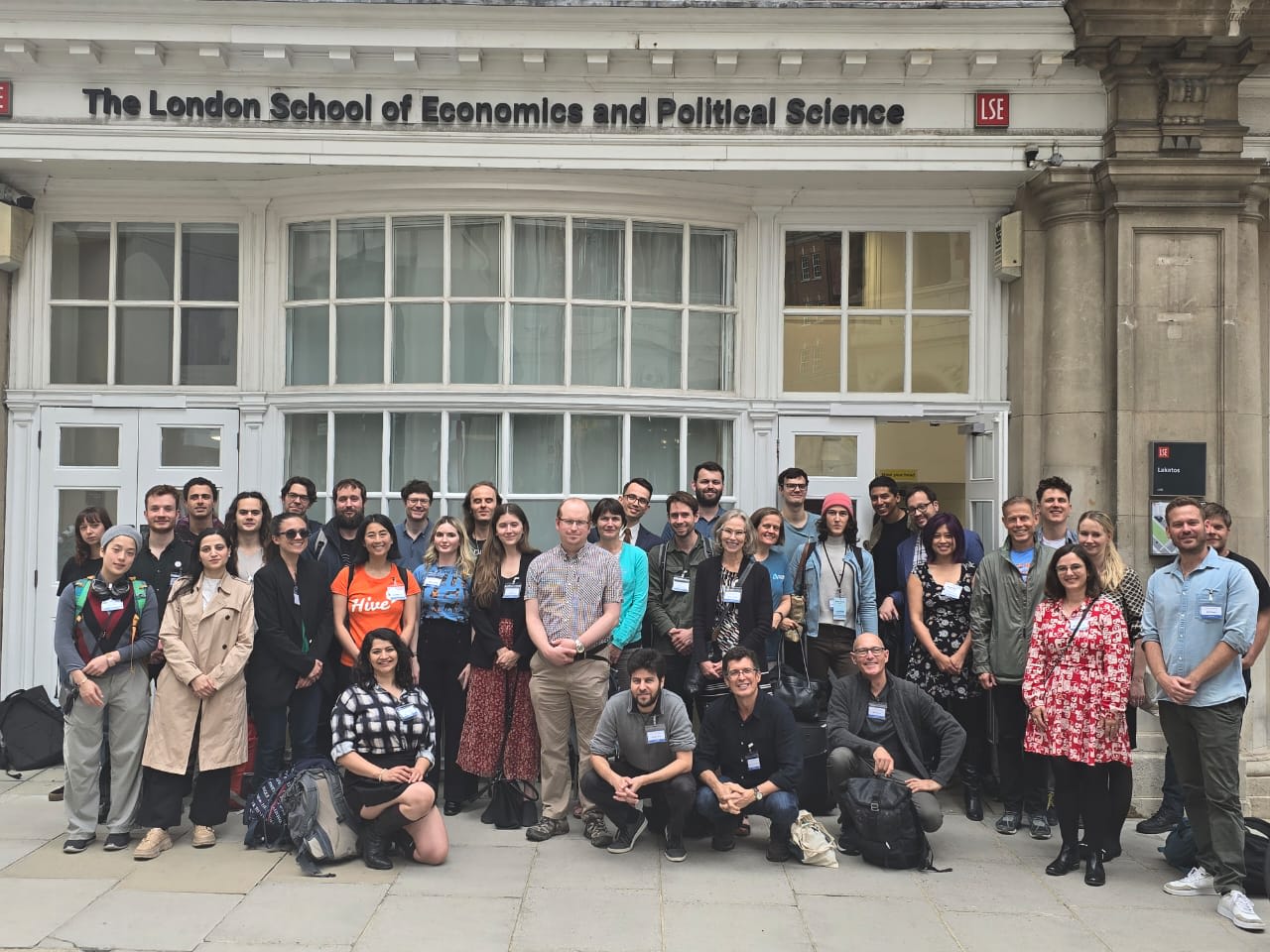
Background
This event followed in the footsteps of the October 2023 Artificial Intelligence, Conscious Machines, and Animals: Broadening AI Ethics conference held at Princeton by Peter Singer, Tse Yip Fai, Leonie Bossert and Thilo Hagendorff. It was planned in a [formerly private] AI Coalition channel on the Hive Slack that many of the attendees of the original conference were invited to for the purposes of continuing conversation. It was here that I discovered that running the conference in 2024 would be highly counterfactual because Peter Singer was retiring from Princeton and none of the previous organizers were planning on repeating it. We were able to get permission to hold the second iteration of the conference and even got a promotional endorsement by Peter Singer. The process of planning took place over several months and was independently funded.
Objective
The goal for this event was to explore how we can develop AI technologies in a way that protects and benefits nonhuman animals and potentially sentient AI. We had the dual purpose of increasing the salience of the field of AI and Nonhumans and also getting potential leaders to network with one another.
To advance the former goal, the content and programming needed to be highly accessible so we made it hybrid, recorded as much as practical, created website pages and social media assets for speakers to help with pre-conference promotion and future SEO for the speakers, and added more event space as the RSVPs crept up. It was open to anyone who could offer value to furthering this field, including, but not limited to, thought leaders, researchers, industry workers, funders and hopeful future contributors.
Timing and location
All in-person events took place in London immediately after EAG London (May 31 - June 2)
- June 3: Conference (hybrid: onsite - live room and overflow room, offsite - livestreaming, and virtual)
- June 4-5: Retreat (virtual and in-person options that only synced up during hour of livestreamed lightning talks)
- June 6-11: Co-working (in person)
Attendees
There were 260+ applications for attendance. A directory was created of people who consented to have their application answers shared with other attendees. These included answers to questions such as: What is your experience or demonstrated interest in the topic? Why do you want to attend? What can you offer to other attendees?
Conference
The 1st day was a hybrid conference:
- It took place at the London School of Economics (LSE), split between 2 rooms which had around 50-60 total attendees.It was also streamed live to Newspeak House which had 10-15 attendees. Around 50-70 people attended via zoom.
- We had a very tight schedule and prioritized having more time for Q&A so each talk was only 10 - 20 minutes long and we grouped similar talks together as panels.
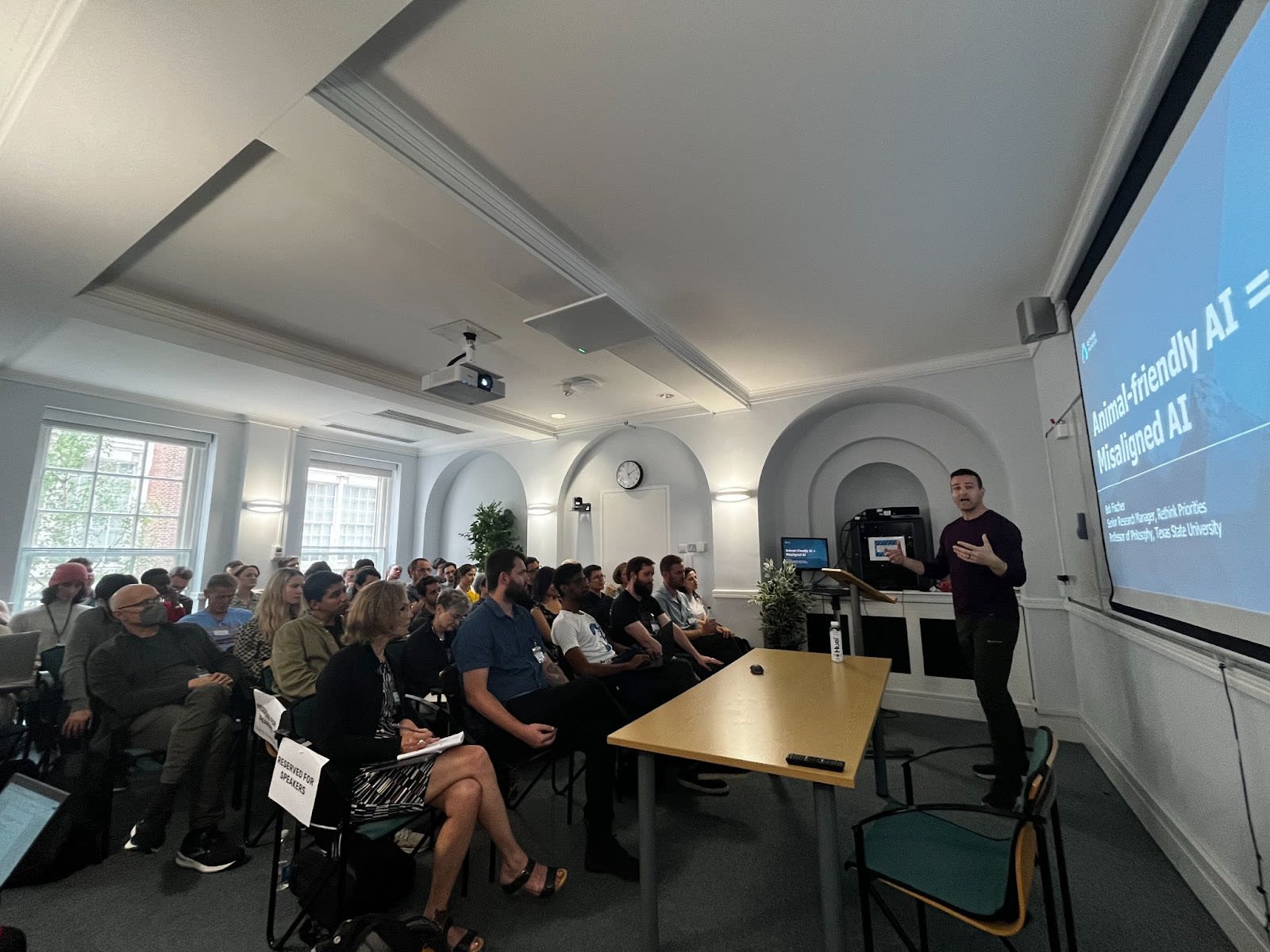
Sessions
AI for Animals
- Towards Ethical AI: Collaborative Efforts for Animal Welfare under the EU’s AI Act by Dr Fakhra Ikhlaq and Dr Saeed Ahmad (watch session | view slides)
- AI's Potential to Map Animal Suffering: Insights from the Welfare Footprint Framework by Wladimir Alonso (watch session | view slides)
- Animal-friendly AI = Misaligned AI by Bob Fischer (watch session | view slides)
- Building Pro-Animal AI Systems panel by Sam Tucker and Sankalpa Ghose (watch session | view slides)
- AI in Farming panel by Virginie Simoneau-Gilbert, Amber Elise Sheldon, and Walter Veit (watch session | view all slides)
Digital Minds
- Changing attitudes toward digital sentience through antispeciesist advocacy by Aditya S.K. (watch session | view slides)
- Sentiments, Sentience, and Moral Standing by Andreas Mogensen (watch session | view slides)
Interspecies Communication
- Reimagining Our Future Relationships with Nonhumans with AI panel by Jane Lawton and Gal Zanir (watch session | view slides)
After the conference, we traveled 30 min by bus from LSE to Newspeak House where the onsite and offsite attendees could interact over dinner.
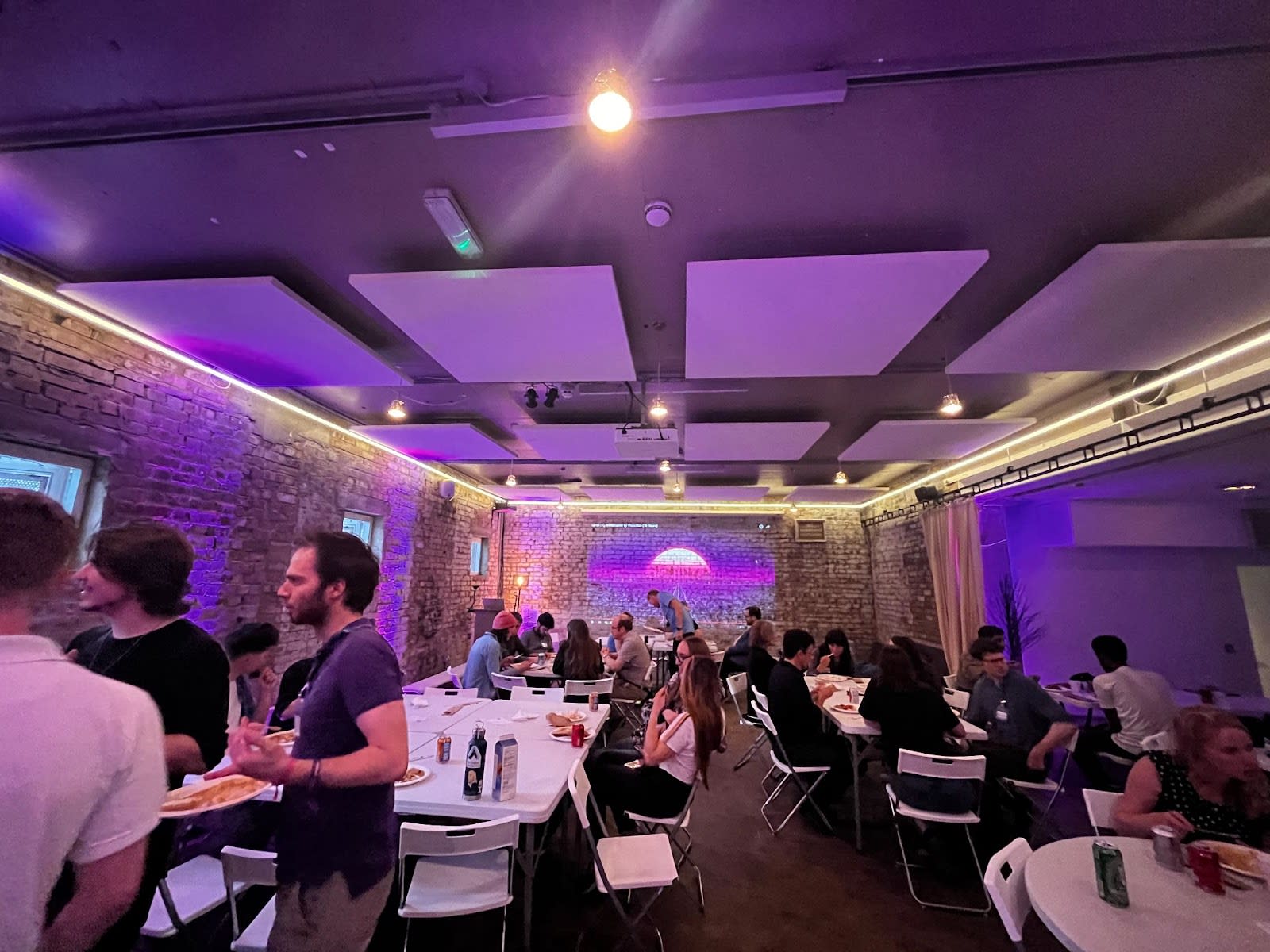
Retreat
The 2 day in-person retreat was run as an unconference
- It took place following the AIADM conference at Newspeak House in London and had ~40 attendees
- Each session was 30 min long and we would ring a gong to indicate time to switch. There were 2-3 sessions going on simultaneously in different areas of the venue. Most of these were not pre-planned.
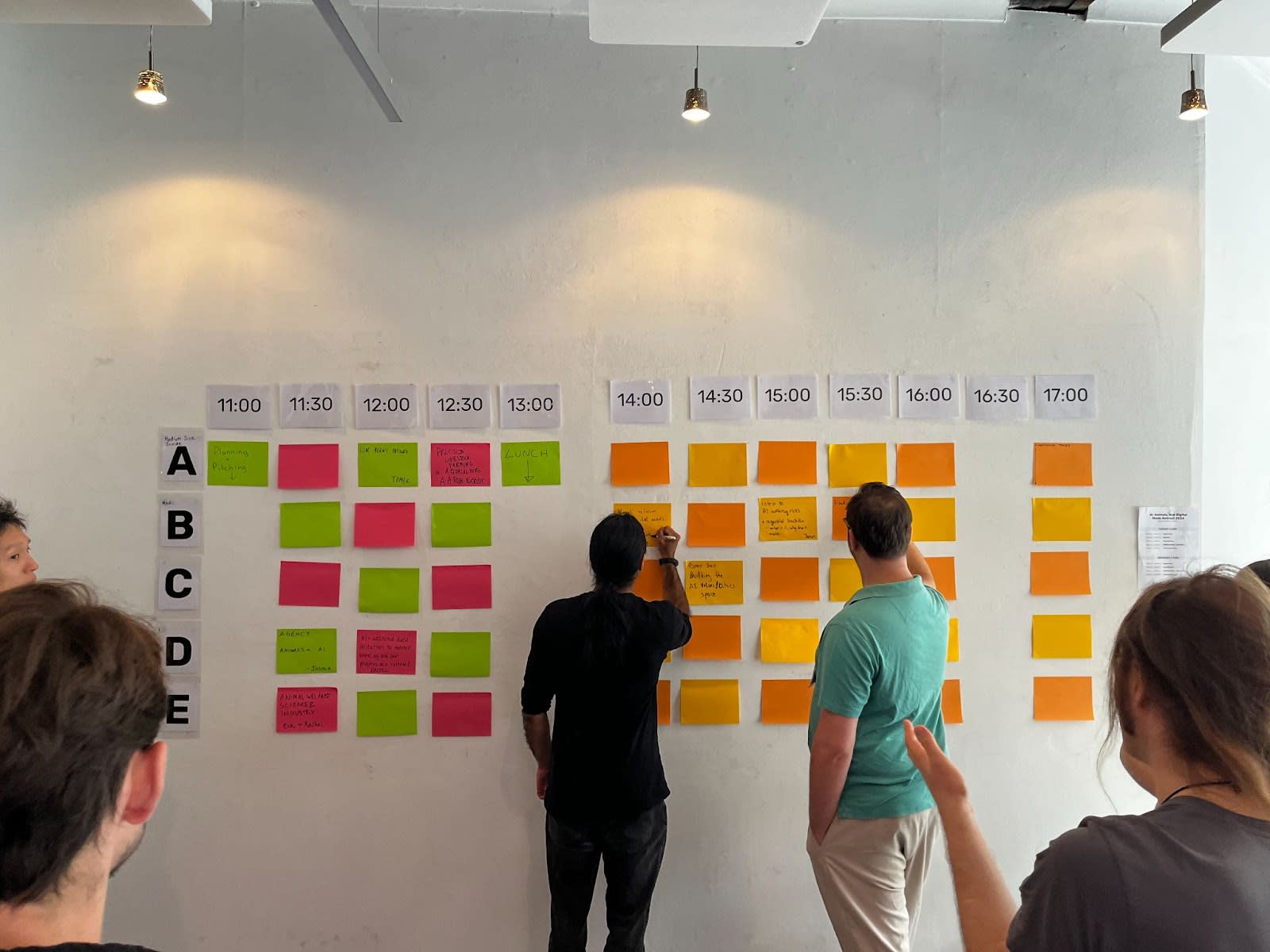
- 1 hour was spent in the morning and afternoon of each day on “Planning and Pitching.” People wrote down their ideas for unconference discussion topics and then pitched it to the group. People were encouraged to ask clarifying questions, modify topics based on feedback, and reschedule if too many people were interested in attending simultaneous sessions.
- Topics included:
- AI+Wild Animals, Optimal Stakeholder Positioning for Influencing Precision Livestock Farming, Finding Digital Mind Interventions Robust to Agential Backfire, Nailing Down Concrete AI/ML Projects to Help Animals, Earth Species Project: How Can Unlocking Communication in Animals Create Greatest Change, and Conflict between AI Alignment and the Interests of Nonhumans.
- Topics included:
- Lightning talks were held both days for 1 hour at the end of the unconference. The first day’s presenters were scheduled in advance, and the session was livestreamed on YouTube to coalesce with the virtual retreat. The second day was spontaneous and people signed up that day for their slots. Both worked well.
- After lightning talks, we had free-form interaction. Many participants used this time to continue having conversations from the day or have dinner at the venue. People left at various times, though many stayed until midnight.
- Throughout the day, people would come and go as they pleased. They could even sit out of discussions altogether and use the time to catch up on some work or have side conversations with other attendees. The unconference format made it easy for participants to conserve energy and only jump into discussions that interested them.
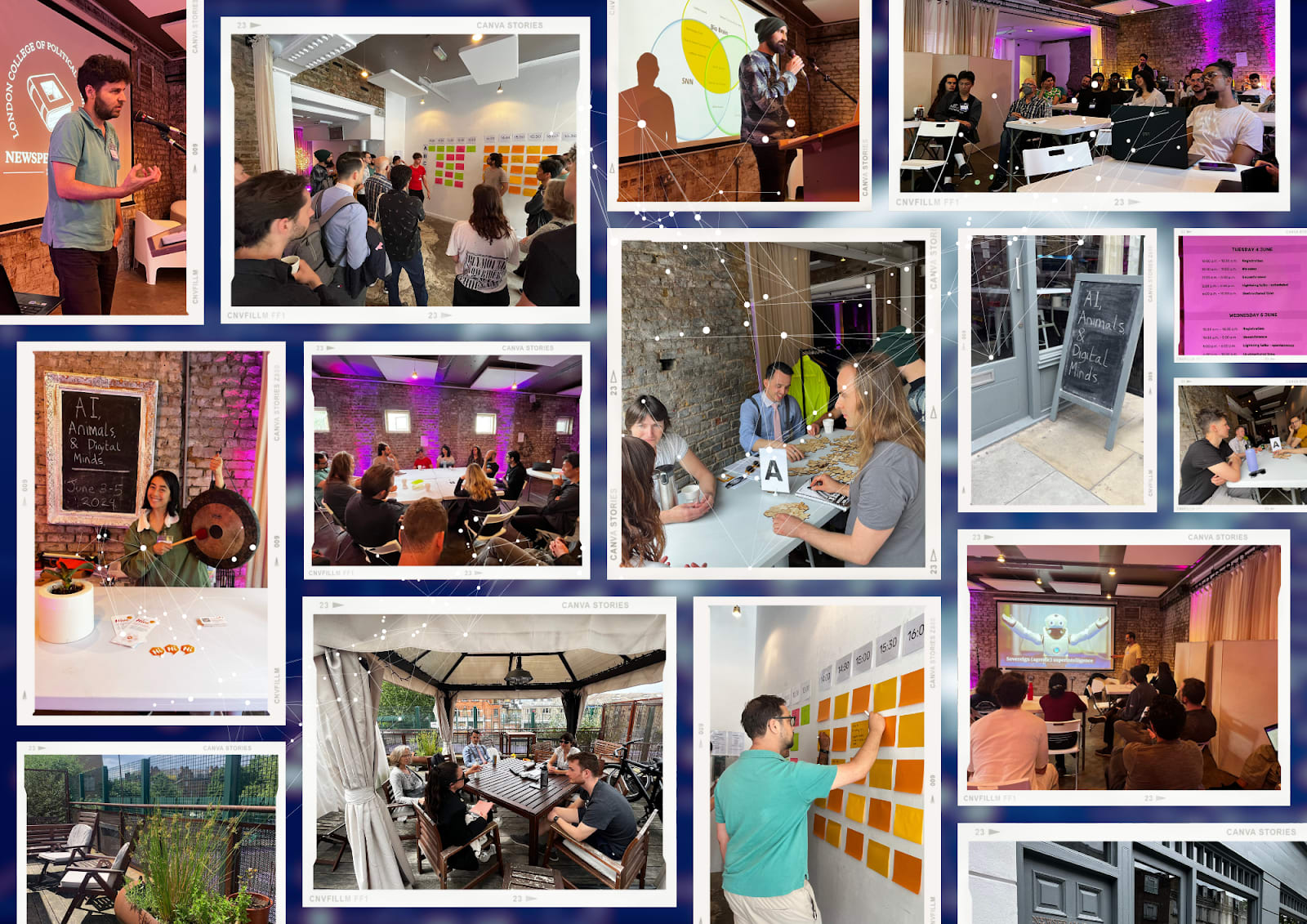
Lightning Talks
- Soenke Ziesche | AI alignment for nonhuman animals (view slides)
- Adrià Moret | A Conflict Between AI Safety and AI Welfare: Should We Control Near-Future AI Systems? (watch talk)
- Ronen Bar | A Slip to the Tongue: How Language Unwittingly Shapes Bias Towards Animals (watch talk)
- Ali Ladak | Some key empirical findings on digital minds (watch talk)
- Alex Schwalb | Neuromorphic engineering as a potential enabling technology for digital minds (watch talk)
- Jane Lawton | AI to Decode Animal Communication (watch talk)
- James Faville | An AMS (Attribution, Moral, Strategic) Model of Advocacy (watch talk)
- Jeff Sebo | Updates from the NYU Center for Mind, Ethics, and Policy (watch talk)
Virtual retreat
- Held in Gatheround for 5 hours for 1 day with a scheduled pause to attend the livestreamed lightning talks
- We provided a summary of the conference talks in case virtual retreat participants needed a refresher or weren’t able to attend. This was created using AI and the zoom transcript, which didn’t turn out to be very high quality because the zoom transcript was not very good.
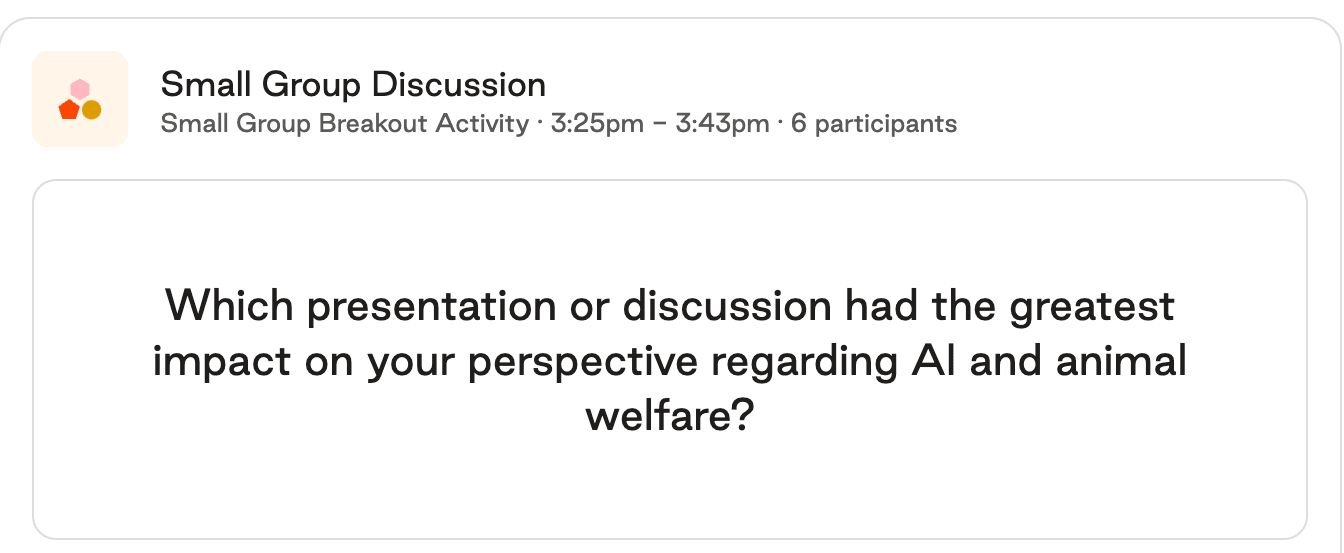
Co-Working
The following 5 days were reserved for relaxed co-working. It was designed for those that chose to stay around London and wanted additional opportunities to network with other attendees while also getting back to work. The co-working space was generously provided by the Center on Long-term Risk. Around 3 - 6 people came for co-working each day and we scheduled relaxed board games at the end of most nights.
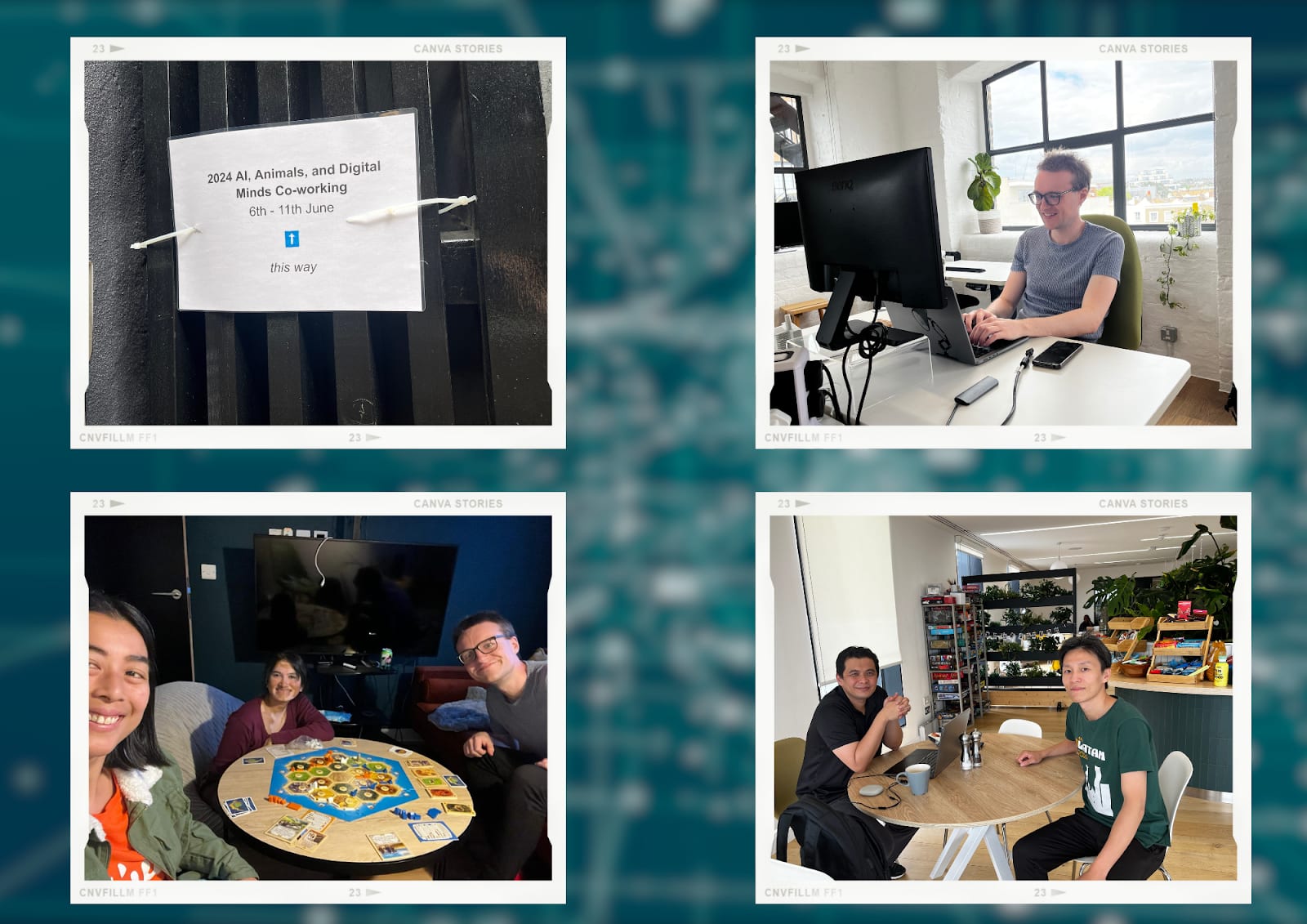
Follow-up Opportunities
Subscribe to AI for Animals Newsletter
We used the conference as an opportunity to gather interest to launch the AI for Animals newsletter. The AIADM application form included a question to ask if they would like to sign up to the newsletter, resulting in 232 initial signups. After discussing with other stakeholders, we decided to include a section on Digital Minds. The newsletter will be mostly written by Max Taylor (Animal Charity Evaluators), with feedback and contributions from experts in relevant fields.
Join the AI Coalition on Hive
The coalition consists of a newly public communication channel, #s-ai-coalition, on the Hive (formerly Impactful Animal Advocacy) Slack focused on active field building in AI and Animals. There are also monthly meetings on the last Sunday of every month. You must be a member of the Hive Slack to join.
Work with us
We are hiring for a part-time project manager for the AI for Animals Coalition at Hive. See job description and submit your interest here. We will send out an application form in the next 1-2 weeks. Currently, we are fundraising (see below) so there is a good (>85%) possibility that this part-time role will expand into a full time role with provisions for going to conferences and more creative work.
Donate to this work
We are fundraising for the full time role for AI, Animals, and Digital Minds for 1 year and have a gap of 48k (46% of total). See our proposal and consider making a donation. For donations over 1k or questions, email hello@joinhive.org.
Tangible Outcomes
- Continued momentum from the first conference in 2023
- The Earth Species Project was in the audience for the last conference. They are not usually involved in EA or animal advocacy spaces, but were able to have a platform at this event to speak to these audiences and find new collaborators.
- Amber Sheldon, a PhD student at Brown University, wrote part of her dissertation as a rebuttal to a talk about Precision Livestock Farming (PLF) by Walter Veit at the 2023 conference. During this year’s conference, they joined a panel together to discuss their different viewpoints.
- Established potential funding for projects at this intersection
- There were at least 2 funding conversations that happened as a result of attendees being able to talk at the retreat.
- Grew interest/literature in the field
- Zach Brown, an research assistant in Economics at MIT, attended the conference and wrote a blog post about PLF inspired in part by the ideas presented by the speakers.
- Created epistemic updates
- Many people said they updated their thinking in response to talks or discussions from the event. This was especially true for Bob Fischer’s talk Animal-friendly AI = Misaligned AI and conversations during the retreat with James Faville where he talked about backfire risks of certain interventions and s-risks with digital minds.
- Connected with other groups working in the space
- We collaborated with adjacent groups, such as Mooanalytica who hosted the Human-Computer Farm Animal Interactions (HCFAI) webinar, on promotions. This helps to set the stage for future collaborations.
Feedback from participants
On the last day of the retreat, around 15 participants gathered to give feedback on the event and provide thoughts on the future of the AIADM community. We also sent out an event feedback form that received 19 responses. Here is a summary of the main points:
- There was some uncertainty around whether to keep Animals and Digital Minds together as a community.
- On the one hand, these communities are quite small and could benefit from mingling and sharing resources. On the other hand, the lack of focus could drive some people away and dilute from creating more concrete outcomes.
- There was a lack of practical outcomes for advocates.
- The conference seemed useful for academics to exchange ideas and write new papers, but there were no tangible practical next steps for people who saw their roles primarily as advocates.
- The unconference format during the retreat was more engaging and valuable than the lecture style conference.
- This is very much biased as mostly the participants who stayed until the end reported this.
- Some people had difficulty with the logistics.
- Some people didn’t know to sign up for the event on Luma, didn’t get the zoom link automatically, didn’t get an email confirmation of their invite, didn’t realize the off-site conference at Newspeak House would just be a livestream, didn’t see the comprehensive guides on Notion, etc.
- Other people said the instructions and emails were quite clear.
- Scheduling the day after EAG prevented many from fully appreciating the conference because they felt exhausted and/or got sick.
- Diversity and scheduling of talks for the conference was great.
- We scheduled the less cognitively demanding and more inspirational talks about reimagining out future with animals and nature at the end to give people a break
- Venue was too packed.
- There were some people who sat on the floor to try and consolidate into one space. While the room at LSE was a great setup for a hybrid zoom event (great microphones to pick up audience questions), it was extremely tight and people did not have a desk to put their laptops on.
- Virtual retreat was too long.
- People could not commit 5 full hours to attending a virtual event and kept coming in and out of the Gatherround, which was not good for creating a feeling of cohesiveness.
Interested in learning more?
This behind the scenes document outlines the challenges and processes of planning, budgeting, managing applications, communicating with attendees, promoting, and coordinating an event, along with lessons learned and tools used.
Thank you to Allison Agnello, @Max Taylor, and @Antoine de Scorraille for providing feedback on this document.